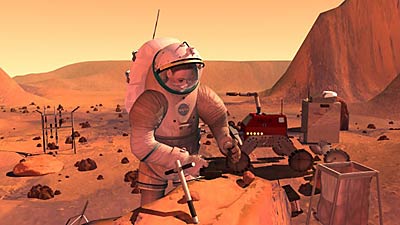The new humans vs. robots debate: introducing the FH Prizeby Michael Huang
|
| Virtually every function that the anti-human-spaceflight human performs can be duplicated in a robot, often with significant advantages. |
Some might say that replacing anti-human-spaceflight humans with robots is impractical or ridiculous. However, it is at least equally impractical and ridiculous to replace all human life beyond Earth with robots. In fact, replacing humans here on Earth is much cheaper than replacing humans beyond Earth, since the cost of putting anything into space is extremely high. It’s also worth remembering that anti-human-spaceflight robots do not need to be autonomous. Like their colleagues in outer space, robots on Earth can be operated by remote control.
Virtually every function that the anti-human-spaceflight human performs can be duplicated in a robot, often with significant advantages. For example, the anti-human-spaceflight activist is often called upon to deliver public speeches and congressional testimonies. The human activist often mumbles, repeats, and forgets parts of his speech, leaving an impression of human fallibility. The robotic activist can deliver a perfect speech every time. The remote operator can sit in the comfort of his office or home, reading the speech off a piece of paper into a microphone, away from the intimidating attention of a large audience. The robot is especially useful when dealing with the hostile audience. The remote operator can freely express controversial and inflammatory points of view, safe in the knowledge that the expendable, replaceable robot will take the brunt of any physical reaction.
Another area where robots excel is the op-ed article. Newspapers are always willing to publish new anti-human-spaceflight op-eds. The problem with human writers is they run out of material to write about. They tend to repeat themselves excessively, to the point where an article published a decade ago has the exact same arguments as one published today. Robotic writers can avoid this problem by using a random op-ed generator. Random text generators, such as the postmodern essay generator, are already being used with great success. An anti-human-spaceflight random op-ed generator would be able to create thousands of op-ed articles at a quality comparable to the human writers of today. Newspapers will be dominated by anti-human-spaceflight articles.
A robot that has both the ability to speak and the ability to create its own arguments naturally leads to the question, “what are anti-human-spaceflight humans for?” Absolutely nothing. Humans are obsolete and decadent; a throwback to a forgotten era. Thinking, living, and existing are nonessential activities. Not only are humans a hypocritical liability for the anti-human-spaceflight cause, but they also consume resources that could otherwise be used by robots.
There may be some soft-hearted moderates who propose that humans and robots fight human spaceflight together. The urge to use both humans and robots must be resisted. The heart of the anti-human-spaceflight movement is its anti-human values. Humans must be eliminated everywhere: in space, on the Moon, on Mars, and in the movement itself. A consistent anti-human agenda that never falters, that never makes exceptions, that never contradicts itself, has the best chance of ultimate victory.
| To retain credibility with the public, anti-human-spaceflight activists must replace themselves with robots as soon as possible. |
The technological and economic case for robots is clear, but some might see a political obstacle: the anti-human-spaceflight humans themselves. Surely they would object to being replaced by robots? Judging from the comments of one famous anti-human-spaceflight human, they would welcome such a move with open arms:
“The cost of doing anything with human beings is vastly greater than doing it with robots. And it’s not clear that the robots don’t do it better.”
“They don’t break for lunch, they don’t complain about the cold nights, and they live on sunshine. I mean, that’s pretty hard to beat.”
“The future’s in robots. Our robots get better every day. Human beings haven’t changed in 35,000 years.”
To retain credibility with the public, anti-human-spaceflight activists must replace themselves with robots as soon as possible. I propose a prize to spur innovation in this new industry: the Forbid Humans Prize, to be known as the FH Prize. The FH Prize will be awarded to the robot most capable of replacing a human in the anti-human-spaceflight movement. It will be bestowed every year at an awards ceremony.
My vision of the future is to walk into a debate hall hosting a humans vs. robots debate, and see a human and a robot shouting angrily at each other. A real humans vs. robots debate. That would be a sign of true progress in our society.
